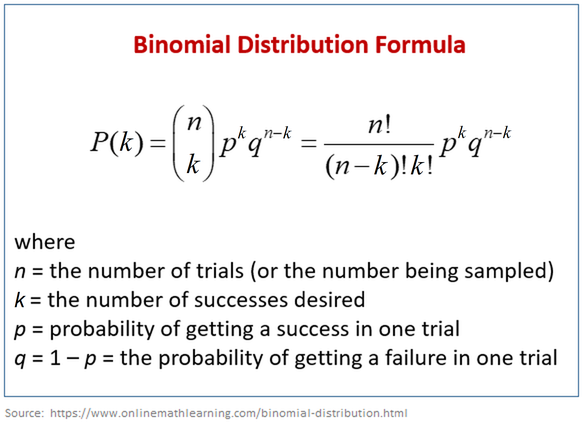Extreme precision
Binomial probability calculator
References & credits: ↑
1. Hover your mouse cursor over the parameters & options in the input form, for “tool-tip” help.
2. If you download binomcalc.pl and run it with no parameters, it displays a brief help message.
3. Pierce, Rod (2020). “The Binomial Distribution,” Math Is Fun.
4. OnlineMathLearning Binomial Distribution lesson.
5. There are many other on-line binomial probability calculators,
but most fail for large values of n. Here are the best ones I've found. I tested them with a difficult binomial
probability calculation (n=35,750), here are the results. (Hover your
mouse over the links below for my comments about each tool.):
Keisan online binomial probability calculator. This one is very good. In fact, if I'd been aware of it when I wrote mine, I probably wouldn't have bothered to write mine.
Unfortunately, the Casio Keisan website was closed on Sept. 30, 2023.
2/29/2024: Good news! The Japanese language version of the Casio Keisan website is still available here(old), and their excellent binomial probability calculator can used via an English translation tool here(old).
- WolframAlpha binomial probability calculator.
- Dr. Harvey Berman's online binomial probability calculator.
- VassarStats online binomial probability calculator.
- iCalcu online binomial probability calculator.
- Richard Lowrey's online binomial probability calculator.
- (please let me know if you find another good one)
6. This tool is written in Perl 5, and it uses the Perl BigRat module.
7. This tool uses GMP, the GNU Multiple Precision arithmetic library.
8. Q: What's with that odd “.sphp” file extension, anyhow?
Download: ↑
To download this binomial probability calculator as a standalone program, right-click here (preview), and
“save link as,” or “save target as,” or similar. It is written in Perl, so you'll need to have Perl installed to use it.
On Windows I use 64-bit Strawberry Perl (currently v5.38.2.2), but most other recent version 5 Perls should
also work. 32-bit Strawberry Perl works, but it's nearly twice as slow.
(There are no warranties, express nor implied, but you can contact me if you have difficulty.)
Footnotes: ↑
1 Large values of n make the calculation slower. For example, if
2 Calculating cumulative probablities, rather than a simple binomial probability, makes the calculation slower, especially for large values of k. For example, calculating cumulative probabilities for k=100 requires calculating binomial probabilities for 101 different values of k, and summing them.
3 Long decimal or repeating decimal values of p (or their
rational
equivalents) can make the calculation slower. This mainly affects the “Experimental” precision settings. For example, if
Last modified: 08-Aug-2025 (version 45)
By David A. Burton.
The “last modified” date & version number on this web page are
maintained automatically by TLIB Version Control.
